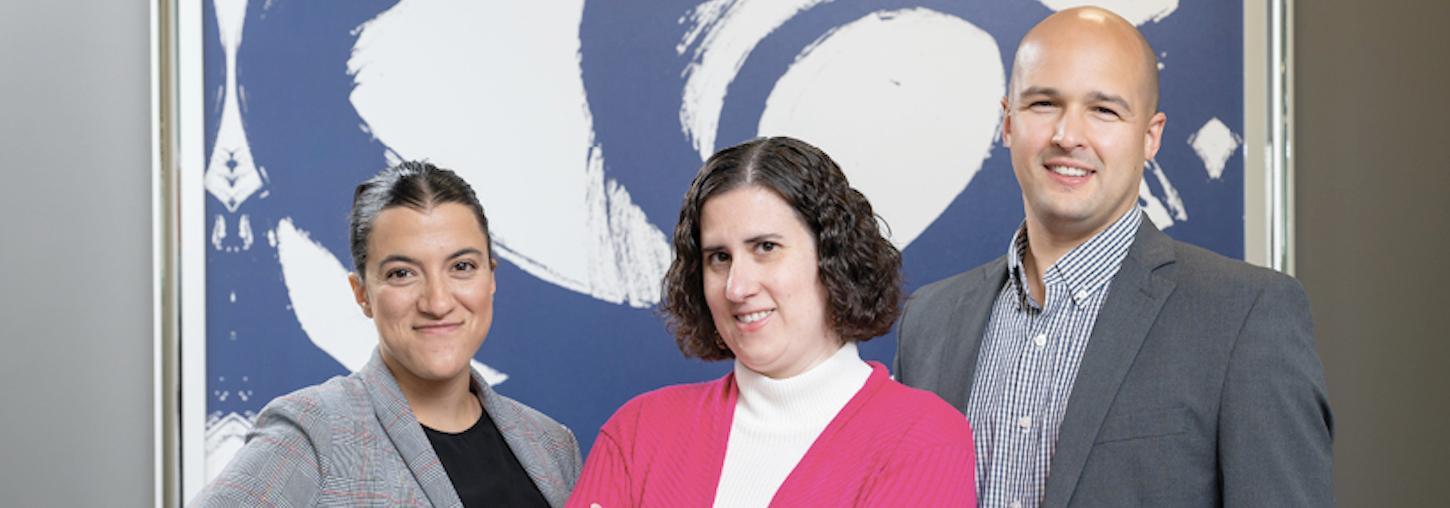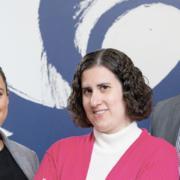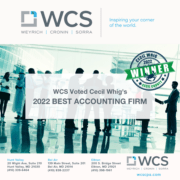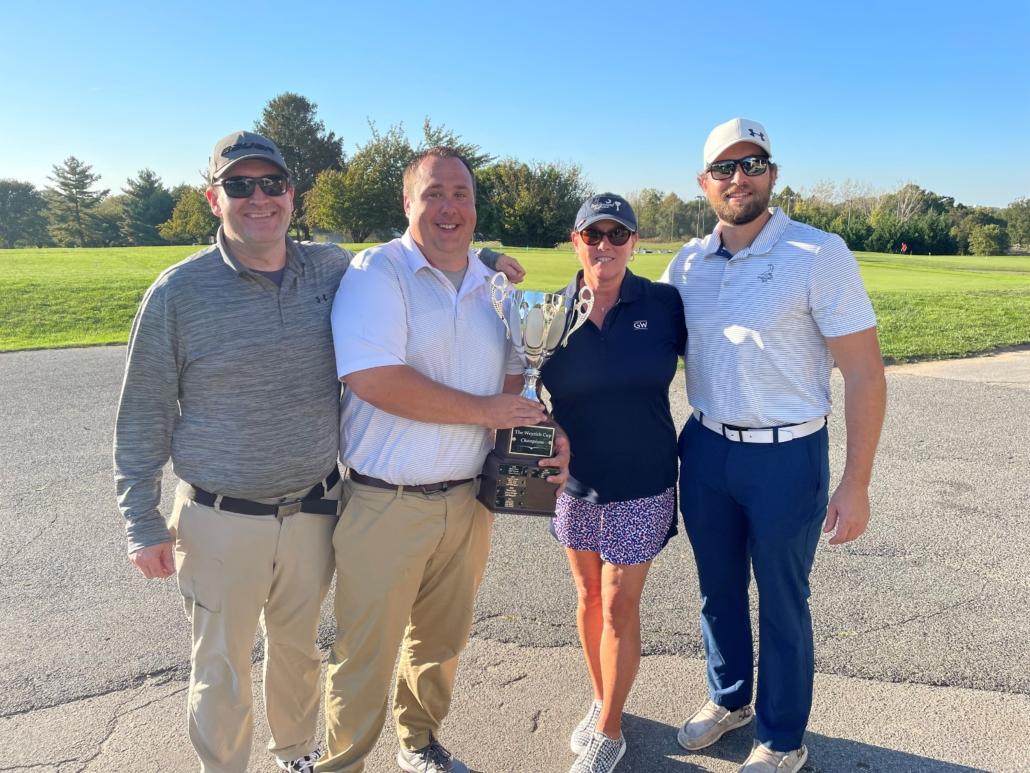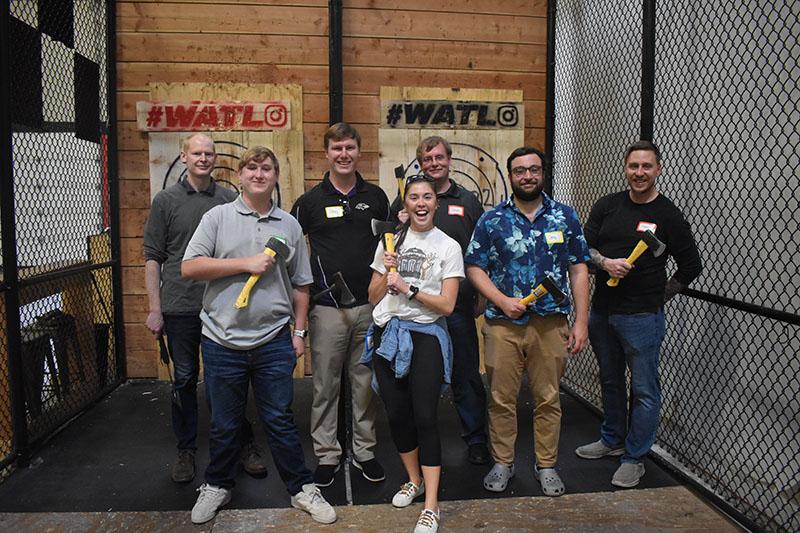WCS Personalizes Every Client Encounter
Accounting for the Importance of Culture
By Tracy Fitzgerald | Maximilian Franz Photography
There’s something special about WCS Accounting. While the 40-plus year-old firm set out to provide a diverse line of services and easily achieved that goal, it also provides something different and unexpected in an industry known mostly for its transactional nature.
The accounting firm built its success by committing to really know their clients – much more than their fiscal status, financial history, and annualized projections. Instead, the team of 55 associates digs deep to understand client history, leadership structure, team dynamics, goals, opportunities, challenges, and threats. They gather and analyze every piece of information, data, and perspective possible. And then they develop and share impactful strategies to help each client position itself for long-term success.
While traditional accounting, tax, and consulting services remain in the mix, WCS has gradually and progressively expanded its service portfolio over time to include both for-profit and non-profit entities.
 “Our clients rely on WCS for comprehensive auditing, merger and acquisition analysis, industry benchmarking, business succession planning, and estate and wealth transfer planning,” says Angeline White, CCA, CPA, partner at WCS. “They know that when they partner with WCS, they are working with a team that will bring industry-specific knowledge and value-based strategies to the table, with focus on achievement of their unique goals.”
“Our clients rely on WCS for comprehensive auditing, merger and acquisition analysis, industry benchmarking, business succession planning, and estate and wealth transfer planning,” says Angeline White, CCA, CPA, partner at WCS. “They know that when they partner with WCS, they are working with a team that will bring industry-specific knowledge and value-based strategies to the table, with focus on achievement of their unique goals.”
Service Beyond the Standard Audit
White explains that standard audits are designed to help owners and leaders at various entities understand and optimize the use of financial statements. They often shed light on where the entity is running efficiently and productively as well as areas with room for process improvement and optimization. Audits conducted by WCS deliver even more than the expected scope.
“My partners and I are here to provide our clients with so much more than a series of compliance products,” says White. “We are committed to building trusting relationships and guiding our clients on what to do with the information their audits or business growth strategies provide. We bring industry perspective, best practices, and resources to the forefront, and inspire action.”
Presentation of a clean and comprehensive audit is step number one, says White. From there, the WCS team translates key findings into action. They meet with management to identify and discuss what opportunities exist, internally, to strengthen and streamline operations in ways that can reduce costs, increase revenue, and boost the bottom line. In many cases, especially within the non-profit sector, these discussions center around steps that can be taken to make the most out of limited resources. Another important step is presentation of an audit with key findings to the entity’s board of directors and staff, with emphasis on how their work is impacting the bottom line.
“When we are presenting an audit, we focus on optimization of financial management processes and what opportunities exist to work better and smarter,” said Nicole DeJarnette, CPA, audit manager at WCS who specializes in the non-profit sector. “We empower teams to be engaged in process improvement strategies and solutions, using the guidance and tools that WCS provides.”
Personalized service and attention remain central as audit presentations take place, and plans of action are defined.
“We know that no two entities are the same,” said White. “We build individually tailored plans and value-based strategies for every client. Both product and process matter, and are what set WCS apart from other firms.”
Charitable Giving, Strategically, or the Win-Win
As the end of the calendar year approaches, many WCS clients seek guidance on charitable giving, with a goal to contribute to non-profit organizations and other charitable causes in a meaningful, yet fiscally positive manner. They key is to plan, thoughtfully and strategically.
“Many clients come to us knowing up front what causes are important to them, but are in need of guidance on how to best facilitate the giving process,” said Frank Linkous, CPA, tax senior manager at WCS. “We provide strategies to help those clients give to organizations that are important to them on a personal level, while effectively reducing their taxable income.”
The strategic planning process encourages willing donors to consider much more than the organizations they wish to endow and the total amount or value they plan to give. They are asked to consider the timeframe that is most ideal to process donations, the funding source (where the money that will be donated will come from), and the specific assets that will be contributed. For some, a cash donation is ideal. In other cases, community giving is seen implemented in the form of stocks, land, or landing building rights, says Linkous.
“These decisions require fairly in-depth conversations because we want our clients to fully understand their options and the pros and cons of each,” said Linkous. “Our goal is to identify the best-case scenario, where valuable community giving takes place and at the same time, the business sees positive impact from a bottom-line standpoint.”
Linkous also advises clients to be diligent in accessing and analyzing the financial reports of the non-profits they are considering supporting. These documents are helpful as prospective donors evaluate how their contributions would be used. There are a number of resources available to help donors collect this information and make informed decisions, from Form 990 to publicly available IRS reports, and GuideStar, a web-based platform that allows donors to search for non-profit data by name.
“As we are guiding clients through this process, we emphasize how important this research is because we want to make sure their donations are used in-line with their intentions,” said Linkous. “Some non-profits use donor funds to build or support programs. Others allocate donated funds to cover or reduce operational overhead costs. Knowing the facts up front is important because these are some of the details that drive how charitable giving decisions are made.”
A Culture Built Around Vision, Empowerment, and Growth
WCS is growing too, right alongside its base of clients. The firm is on a constant search for new talent, emphasizing that buy-in to company culture is as important as skill set, during the recruitment process. As leaders meet with job candidates to discuss employment opportunities, they are clear about the unique approach WCS takes in establishing and building client relationships, and that knowledge sharing is a fundamental value, internally. They also emphasize that WCS is a company that is dedicated to giving back to its community through volunteerism, sponsorships, and fundraising.
 “Our practice is very giving to our clients, each other, and our community. Transparency is key, and it starts during the interview process,” said White. “The partner group makes our processes and expectations very clear. This is a team that collaborates, trusts, and values one another. We work with a shared purpose and goal in mind, and they are to put the needs and goals or our clients first, every day. When we extend a job offer to candidate, we are confident that they are onboard with our culture and business philosophy, and will be a good fit for our team.”
“Our practice is very giving to our clients, each other, and our community. Transparency is key, and it starts during the interview process,” said White. “The partner group makes our processes and expectations very clear. This is a team that collaborates, trusts, and values one another. We work with a shared purpose and goal in mind, and they are to put the needs and goals or our clients first, every day. When we extend a job offer to candidate, we are confident that they are onboard with our culture and business philosophy, and will be a good fit for our team.”
Jazmin Petrantonio recently joined WCS as a staff accountant who works with a significant number of nonprofit clients. She can attest to White’s statement, noting that company culture was a major focus during her interview process, and the opportunity for solid professional growth was a major motivator in her decision to accept a position at WCS.
“It was very clear that WCS is a firm that creates career paths for its people, and that by coming to work here, I would have exposure to a lot of different clients with a lot of different business needs,” said Petrantonio. “Everyone here is committed to putting their best foot forward for our clients, and is empowered to lead. It’s a good place to be.”
Learn More
WCS has offices in Hunt Valley, Bel Air, and Elkton, Maryland. For more information about the firm’s comprehensive line of business services or to schedule an initial consultation, contact us.

